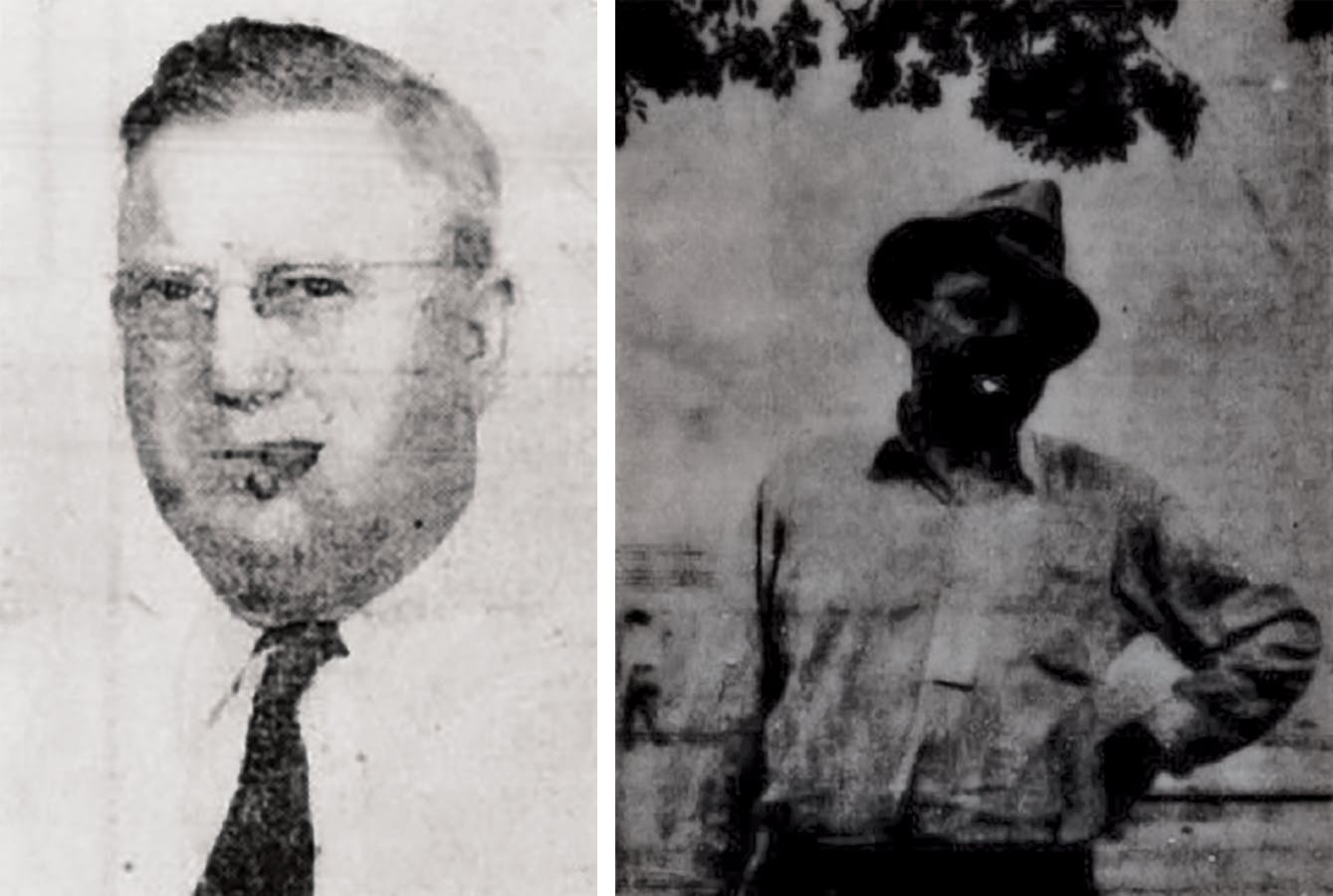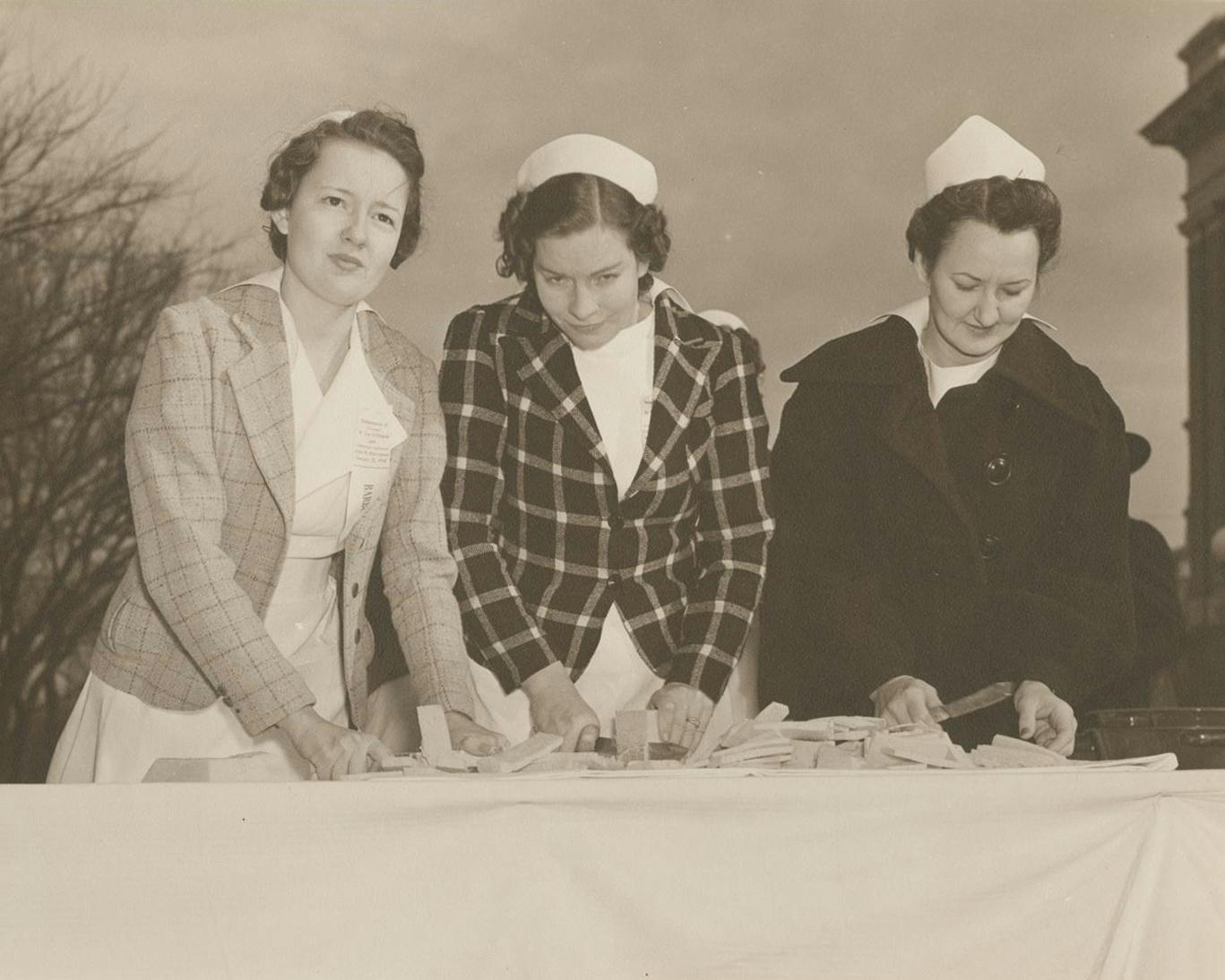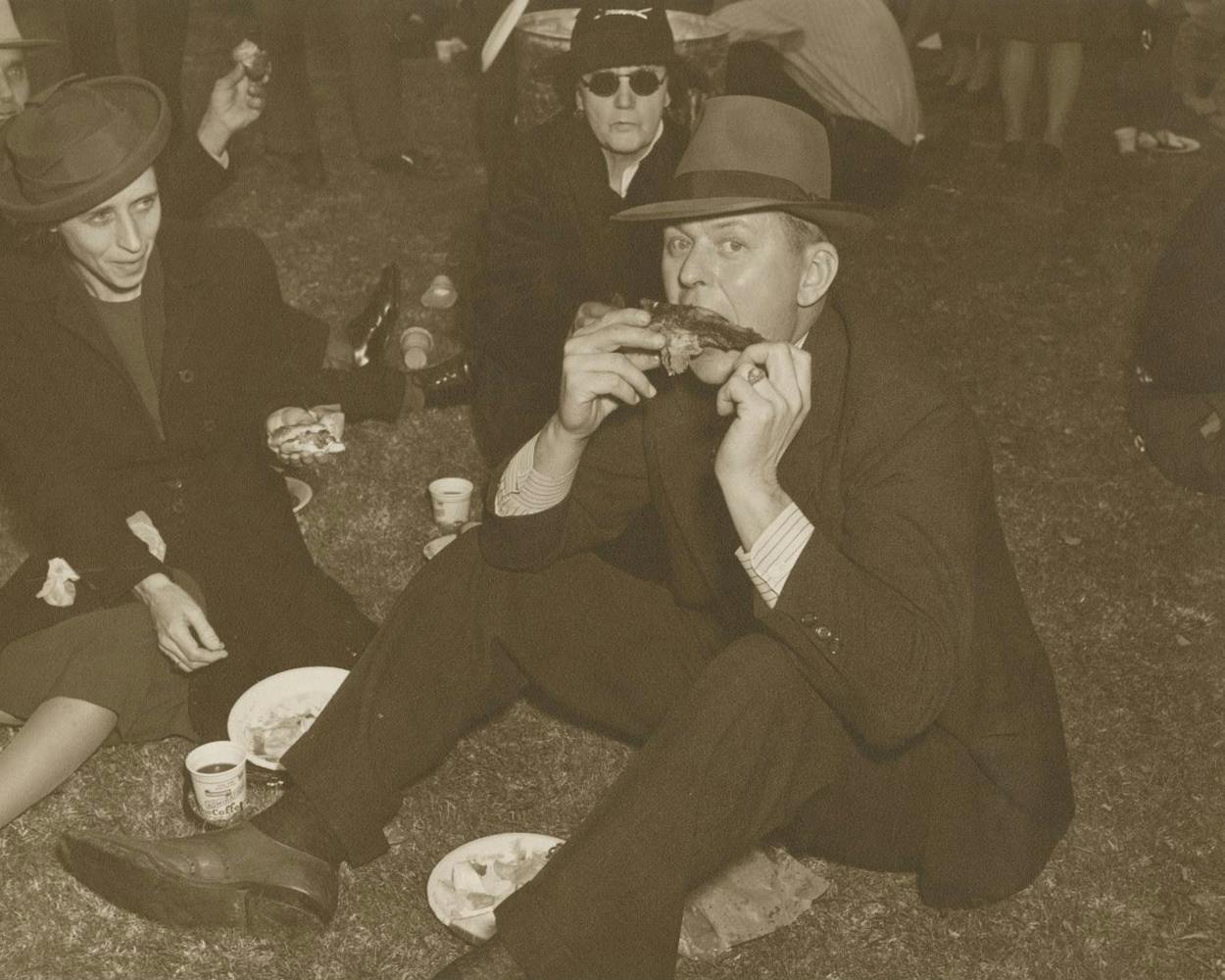The World Championship Barbecue Cooking Contest at the Memphis in May festival and the American Royal barbecue contest in Kansas City are two of the biggest and most prestigious barbecue competitions in the country. Held annually since 1978 and 1980, respectively (and hopefully again this year), they’ve earned their name recognition. However, they both started years after the first World Championship Cow Country BBQ Cookout, held in Uvalde in 1972. It’s no longer around, but it was the first recorded event that resembles the barbecue competitions of today. (Maybe you’ve read about the Kaiser Cookout held in Hawaii in 1959, which I don’t count since it was really a grilling competition sponsored by an aluminum foil company.) These cook-offs are practically a competitive sport nowadays, but they were rare before the seventies. So it was surprising to find mention of a barbecue cook-off in Borger in the forties—and a truly wild one at that.
The story starts with a rivalry between a newcomer and an incumbent. Quay Franklin arrived in the little Panhandle town of Borger in the summer of 1942 to build a rubber plant. The Ohio native had just moved from Tulsa, and it took only a few months before the new guy in town began questioning the supremacy of the established local barbecue royalty, Bob “Barbecue King” Grimes. That fall several Borger residents were hospitalized after being bitten by some rabid dogs. “‘Mad Dog Scare’ Sweeps Borger” was the front page headline of the Borger Daily Herald; Franklin offered his own explanation for the outbreak. “The mad dog scare was created when Grimes threw his barbecue over the back fence and the dogs ate it,” he declared. That was some serious barbecue smack talk from a recent transplant. The reigning king stayed mostly silent.
Grimes was a prominent figure in Borger. He was president of the Panhandle Bank and the Lions Club, and he regularly hosted barbecues at his home. By September 1942, however, the Daily Herald reported rumors of a barbecue duel. “Although Grimes is famous for his barbecue sauce, Franklin believes that his will put the banker’s in the shade,” the article read.

The feud was a much-needed distraction for the people of Borger. Less than a year earlier, the attack on Pearl Harbor had plunged the United States into war. Most of the news being reported was coming in from the European and Pacific fronts, except for the mad dog scare and a local barbecue competition that was covered like a once-in-a-decade prize fight. County commissioner Fritz Thompson penned an article a couple days after the competition was announced to volunteer his services as a judge. “As to my ability I have, perhaps, eaten more barbecue than any other living man of my age and size,” he boasted. Columnist Valda Cypher responded to Thompson, saying, “I agree with you that you’ve probably eaten more barbecue than any other living man of your age and size.” She then asked, “Why not let the women help with the judging in this contest?”
She didn’t get her wish. Women weren’t invited to the event, let alone the judge’s table. There was a lot of hype leading up to the cook-off—rumor was that Grimes had used a fishing trip to the mountains as cover for a secretive world-collecting expedition—but it ended anticlimactically. “Chief Taster Thompson made his last official ‘taste’—blindfolded—and announced it a draw,” noted the report on the front page. It all seemed like a scheme designed for a rematch. “If anyone thinks that the Royal Prerogatives in the Barbecue Kingdom of the sunkissed fuel and hickory wood can be settled in one single contest, they have another guess coming,” the paper’s editor wrote.
For the rematch, the women in town demanded to be included. “We stay at home, mind the children, darn socks for our husbands and keep smiling, just like wives are supposed to do, while our husbands eat one barbecue after another,” an anonymous local woman said. She continued, “[We suspect] the men know their cooking could not compare with what the good wife serves at every meal during the week.” Marvin J. Paul, manager of the Borger Chamber of Commerce, announced to the paper—in what sounded like the most condescending tone imaginable—that a barbecue “the ladies” could attend had been planned all along. It was all a misunderstanding, he said. The rematch was to be held in a week, without any female challengers. It would again pit only Grimes against Franklin.
The day before the rematch, an aspiring barbecue challenger emerged, bringing more bravado than even Franklin had previously exuded. “Why I’ve tried to eat that stuff that Bob Grimes calls barbecue, and how he ever acquired the title of ‘Barbecue King’ will ever remain a mystery,” the anonymous challenger declared in the newspaper. He didn’t spare Franklin either. “I’ve also tried that product of Quay Franklin’s, and the more I’d chew it the bigger it would get—he must have mixed up some synthetic rubber with it.” This person told the paper that they preferred that their identity remain a mystery. They would compete only if allowed to wear a disguise, and would go by the name “Masked Marvel.” Neither Grimes nor Franklin accepted the challenge.
The second barbecue was held at the American Legion Hall, where 135 attendees sampled barbecue from Franklin and Grimes. The Masked Marvel didn’t reveal his or her identity, but was in attendance. An article recapping the event didn’t mention a winner; however, a profile of Franklin the following August noted that Grimes had retained his crown. The recap included a photo of Franklin holding a very large onion given to him by Grimes, and noted, “Barbecue Kings Franklin and Grimes exchanged gifts and wit.” On the same day, reports came in from Guadalcanal that a fourth carrier was lost by the U.S. Navy. The night before, a drunk man at a Borger bar performed a Nazi salute and yelled “Heil Hitler.” He was beat up by the patrons and sent to the county jail.
The Masked Marvel didn’t relent after the rematch. “Those birds still know little or next to nothing about barbecue and how to prepare it,” he said. I only say “he” because that’s the pronoun the reporter chose to use. I still suspect it may have been a fed-up housewife or even Valda Cypher herself. After all, even Franklin acknowledged that he learned to cook barbecue from his wife. Grimes asked of the Masked Marvel, “Why doesn’t he come out in the open and cook his meat like a man?” The Masked Marvel promised to remove the mask if Grimes or Franklin prevailed. The next day, the Marvel bragged, “When the people eat my barbecue, they’ll be ready to throw rocks at Grimes, Franklin or anyone caught eating their product.”

We’ll never know the identity of the Masked Marvel, or if indeed she stayed undercover because she was a woman. Men still far outnumber women in today’s barbecue competition circuit. Thankfully, they’re not excluded from the judges’ table any longer, nor from the ranks of the stars. Barbecue competitor Lee Ann Whippen is on the list of nine Barbecue Hall of Fame semifinalists this year, and pitmaster Melissa Cookston was voted into the Barbecue Hall of Fame in 2017 (full disclosure: I’m on the nominating committee).
Neither Borger nor the rest of the country would see another barbecue competition for some time. Meat shortages soon took hold, and rationing began in March 1943. On the eleventh of that month, the Borger Daily Herald reported that Lieutenant Governor John Lee Smith and his wife were coming to town. Bob Grimes, still referred to as the Barbecue King, would cook for them. “It’ll probably be the last beef meal Borger will have an opportunity to enjoy en masse. Probably, in the future, our distinguished visitors will find themselves eating rabbit, muskrat—or even horse meat,” the paper surmised.
After the meal, the Masked Marvel published one last scathing insult: “King Grimes boasted that his barbecue was hickory cooked, but if you should ask me, one who knows his barbecue, I’d say Grimes made several trips to the cow pasture in preparing that stuff.”
A reporter for the paper didn’t seem all that concerned with who deserved the barbecue crown: “Maybe when this war is over the masked marvel will be given his chance, and we, the residents of Borger, will get our chance.” Those folks pined for a return to familiarity, just like we do now. As we wish for barbecue events to resume, and hope for a return to a predictable beef supply, we’ve begun using a term I noticed so often in these articles: “the duration.” It described the indeterminate length of World War II then, and the unknown length of the pandemic now. The people in Borger then dreamed of another big beef barbecue on the other side of the duration, and today, I couldn’t agree with them more.
- More About:
- Texas History








